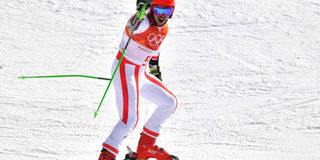Peerless Hirscher completes Olympic double with giant slalom win

Austria's winner Marcel Hirscher celebrates after the Men's Giant Slalom at the Jeongseon Alpine Center during the Pyeongchang 2018 Winter Olympic Games in Pyeongchang on February 18, 2018. PHOTO | DIMITAR DILKOFF |
What you need to know:
- Hirscher, who finally won an individual gold in the alpine combined on Tuesday after dominating the World Cup for the last six years, clocked an aggregate of 2min 18.04sec down the Rainbow 1 course at the Yongpyong Alpine Centre.
- Norwegian Henrik Kristoffersen claimed silver, 1.27sec adrift of Hirscher, with France's Alexis Pinturault following up on his combined silver with bronze, a further four-hundredths back.
PYEONGCHANG
Austrian Marcel Hirscher claimed his second Olympic gold of the Pyeongchang Games on Sunday, showing all his class and experience to comprehensively win the men's giant slalom.
Hirscher, who finally won an individual gold in the alpine combined on Tuesday after dominating the World Cup for the last six years, clocked an aggregate of 2min 18.04sec down the Rainbow 1 course at the Yongpyong Alpine Centre.
Norwegian Henrik Kristoffersen claimed silver, 1.27sec adrift of Hirscher, with France's Alexis Pinturault following up on his combined silver with bronze, a further four-hundredths back.
"I'm very thankful to finally have two gold medals," said Hirscher. "Remembering back to 2010 and 2014, finishing twice in fourth position (in giant slalom), it's really good to be in first position.
"After the first run I thought to myself that the confidence is here and speed is here and I can win the race. There's always a mind game between the first and second runs, but the years of experience helped me."
"Right now he's the best," Hirscher's coach Michael Pircher said.
"At aged 28, he's had his best season since he started skiing — already 10 victories in the World Cup, leading in GS, slalom and overall standings, and now two gold medals.
"His career was already fantastic. He's shown that in the World Cup, but hadn't shown it in the Olympics. It was just that Olympic gold that was missing from his collection."
Pircher added: "He's very special, very focused on his skiing and very professional, be it with his preparation, material, nutrition, conditioning, training or physiotherapist."
"The older we get the better we are!" retorted Hirscher, hailing his performances as a result of a great team at their "peak".
Hirscher, a six-time consecutive World Cup overall champion, showed none of the nerves that afflicted American Mikaela Shiffrin in her failed attempt to defend her slalom title after winning the giant slalom the previous day.
He laid down a near-faultless first run on a course that saw many other racers come unstuck on a tricky, twisting run-in to the finish line.
That left him a very healthy 0.63sec ahead of closest rival Pinturault, Kristoffersen paying the price for a mistake to finish 10th, 1.31sec off the pace.
When the Norwegian took to the slope for the second run, he raced down in the fastest time in an impressive display of aggressive skiing, 0.04sec faster than Hirscher's leg.
'DIFFERENT LEAGUE'
But Kristoffersen's late heroics were not quite enough for a second alpine Norwegian gold of the Olympics as his Austrian nemesis powered from the start gate to deliver yet another masterclass under pressure.
"It was a great second run for me," said Kristoffersen, who won slalom bronze in Sochi.
"I went a lot straighter in that second run. I knew I had to take a risk, chance it to get on to the podium.
"Marcel's in his own league at the moment, we're fighting for silver and bronze for sure."
Defending Olympic champion Ted Ligety had a shocker.
After failing to finish the super-G in South Korea, the 33-year-old American laboured down the course in his bid to become the event's oldest Olympic medallist, eventually coming in a massive 3.21sec behind Hirscher.
"Today was definitely a tough day at the office," said Ligety, who stormed to a shock first Olympic gold in the combined in Turin in 2006, before he had even won on the World Cup circuit.
That first World Cup victory came three weeks after Turin, when he won a giant slalom at Yongpyong. He hasn't raced there since.
"In the first run I didn't ski with anywhere near the intensity, cleanliness and attack I needed to," he said.
"The second run I tried to step it up but I just didn't have the speed in me today. It's an unfortunate day to have a bad day.
"Ski racing is a really tough sport to predict and truly plan for because you have such a small opportunity of window to show what you've got."





